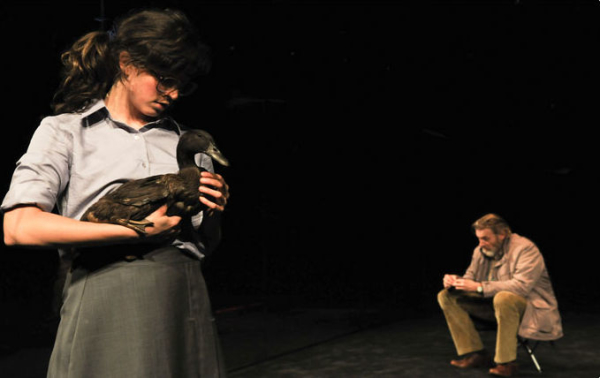
© Heidrun Löhr
When George Bernard Shaw saw Ibsen's The Wild Duck in London in 1894 he was shaken with horror, pity and laughter; only the last of these reactions coursed through my veins watching this 75-minute distillation from the Belvoir in Sydney, the last of three visiting productions in the Barbican's international Ibsen season.
A real live duck waddles around in a large glass booth. Quacking good idea, that. The duck will be coddled by other characters, left flapping around in a smaller glass tank: it's a symbolic relic of old Ekdal's attic menagerie, relocated by designer Ralph Myers as his son's trendy minimalist workplace of earth and glass. Young Hjalmar Ekdal (Brendan Cowell) is a photographer about to have his life torn apart by a priggish friend, Gregers Werle (inscrutable Dan Wyllie), and his marriage ruined.
The play, to be fair, is accredited not to Ibsen but to the director, Simon Stone, and writer Chris Ryan, though they do retain the bald outline of Ibsen's plot and communicate the tangled relationships in these two families. They focus on Ekdal's teenage daughter, Hedvig (Sara West), who mopes around in grey school uniform and specs, toting a shotgun she's borrowed from granddad. She's the hunter, and the prey.
And she's a modern example of a dysfunctional stroppy adolescent, not Ibsen's innocent virgin. The old friends are divided by fate and deep secrets. Their respective fathers – John Gaden as the businessman Haakan Werle, going blind in shades and a white suit, Richard Cowell as the gruff huntsman Ekdal, wrongly imprisoned in the past – both seek compensation from, and revenge on, perhaps, their sons.
But the complexities and weirdness of Ibsen's five-act masterpiece are reduced to a skeletal ragbag of narrative info on a self-consciously brandished stick. The actors are at once vocally enhanced and strangely muffled behind the glass wall. It's Ibsen for people who don't care about Ibsen, in a way that Thomas Ostermeier's sensational production of An Enemy of the People simply wasn't; Ibsen's plays shrivel without any crucial definition of social strata, or theatrical accumulation, however much you try and take a fresh look in other ways.
Simon Stone claims that he's anatomising a tragedy: hence the clinical feel to a show that is unevenly (and not very well) acted and curiously uninvolving. Only Anita Hegh as Hjalmar's wife, Gina, plumbs the sort of depths Shaw was talking about, and it seems that even those might be renegotiated within a few months of the cataclysmic tragedy, as the devastated couple stagger towards the abyss.












